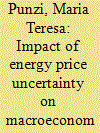| Srl | Item |
| 1 |
ID:
166574


|
|
|
|
|
| Summary/Abstract |
This paper evaluates the macroeconomic implications of energy price volatility through the lens of a dynamic stochastic general equilibrium (DSGE) model in an open economy. The model develops a small open economy in which households consume energy products and firms use energy as productivity inputs, where the country is so small that it needs to import energy, the price of which is determined abroad. Whereas positive energy price shocks cause an economic slowdown due to higher costs for consumers and firms, energy price volatility shocks generate an increase in GDP in the short-run and a reversal in the long-run. These findings are empirically supported by estimates from a Panel VAR model applied to 10 Asian economies, where energy price volatility has a positive impact on GDP in the short-run. Moreover, the paper finds that increasing demand or supply uncertainty also affect energy prices, with amplified fluctuations relative to a model that abstracts from energy. Market volatility leads households to cut consumption for precautionary savings motives, which in turn increases investment.
|
|
|
|
|
|
|
|
|
|
|
|
|
|
|
|
| 2 |
ID:
096229


|
|
|
|
|
| Publication |
2010.
|
| Summary/Abstract |
This paper uses a stochastic volatility model, structural break tests with unknown point, and a counterfactual simulation method to discuss the significant decline in inflation uncertainty in China over 1978-2009. We attempt to quantify the contributions of better monetary policy and smaller structural shocks (including demand, supply and policy impacts) on the reduced inflation uncertainty. Empirical results in the present paper suggest that improved monetary policy accounts for only a small fraction of the reduction in inflation uncertainty from the pre-1997 period to the post-1997 period in China. The bulk of the significant moderation in inflation uncertainty arises from smaller shocks. This finding indicates that the quiescence of inflation in China over the past decade could well be followed by a return to a more turbulent inflation era. Therefore, the use of preemptive monetary policy to anchor inflationary expectations and keep moderate inflation uncertainty is warranted.
|
|
|
|
|
|
|
|
|
|
|
|
|
|
|
|